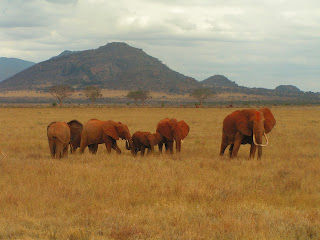 |
| African Elephants. Kenya, 2008. |
The Australian Rabbit-proof Fence is interesting because it discusses the issues around managing invasive species. I don't recall if they use that specific term in the podcast, but Australian rabbits are a classic example in invasion ecology. An interesting note, which they bring up in the podcast but do not expand upon, is the potential to introduce a virus to control rabbit populations. This is another classic example in the scientific literature concerning biological control. Biological control can be defined many ways, but the definition I currently like best can be found in Eilenberg et al. (2001): "The use of living organisms to suppress the population of a specific pest organism, making it less abundant or less damaging than it would otherwise be." And though this definition technically excludes viruses, I very much doubt the authors would dispute the fact that the use of viruses to control pest populations is, in fact, biological control. The virus referenced in the podcast is one of a group of myxoma viruses, which have been used to control rabbit populations in Europe. One one level, the argument for biological control is that it helps us avoid potentially more harmful control measures (like poisons or pesticides) and it may be naturally sustaining (such as a virus which has natural cycles within the population) making it more cost effective. More cost effective, say, than continually up-keeping a fence to exclude rabbits. However, biological control isn't always perfect and introducing a biological control agent to control another introduced species can have a run-away effect. These sorts of decisions are heavily researched and the literature surrounding the study of biological control is very interesting.
Another really cool podcast I heard earlier this month was from my favorite podcast of all: Science Friday. It was a discussion with Michael Pollan's about his new book, Cooked: A Natural History of Transformation. In the interview, he discusses the ecosystem inside your guts. I don't know about you, but I love, love the idea of thinking of myself as an ecosystem where I am the manager and I have to care for the populations. Oh wait, you didn't realize I was that nerdy? He also talks about fermented foods and how there is a process of ecological succession among the communities of bacteria growing in your sauerkraut or kombucha. I found this section exceptionally fascinating and plan to ferment some stuff over the summer. Science plus cooking, I love it.
 |
| I tried to find a picture of Meridith, Colin, and I, but I'm not sure I have one! You'll have to settle for Colin and Meridith as biology babies (2007). |
Last up in this segment, I'd like to plug two of my friends who recently got scientific papers published. I'm at that age where some of my friends are having babies, and my friends are birthing research papers. Some are doing both at the same time, overachievers! Anyhow, my long time ecology friend Colin Kremer was first author on a cool study in the Journal of Theoretical Ecology entitled, Coexistence in a variable environment: Eco-evolutionary perspectives. I love papers like this because they attempt to address questions that bridge fields in biology. Specifically, how does ecology interact with evolution, and how will this impact the communities we observe. Last, but not least, a recent paper by the all time ecology love of my life, Meridith Bartley was recently published in the journal Biomass and Bioenergy. Her paper, Effects of salinity on growth and lipid accumulation of biofuel microalga Nannochloropsis salina and invading organisms, attempts to improve efficiency of production for the marine algae used in many algae biofuels operations. Again, her study is unique because it takes an ecological perspective on the problem by incorporating competition and predation from invading organism. Okay, end shameless plugging of my friends.
Last Word: I'm always finding that non-science focused things make me think of science. That's probably because I spend so much of my day thinking about science related issues, but it's still fun to find connections. No matter if you are biking to school, fixing your dinner, or making new friends, all roads can lead to science eventually. I just love that.
What do you think? Do you see connections between outside events and your field of study? Where do you get your news? Internet, print, podcast? Do you have any cool science news to share?
I heard the emu war and rabbit proof fence podcasts! :P I rarely listen to Stuff You Missed In History Class, but when I do, I'm always intrigued. So funny that you mentioned those two since those are two of probably 5 I've listened to. :)
ReplyDeleteThat is pretty funny! I really like that podcast. I have never been a history buff, so I always feel like I'm getting a "Stuff you should have learned in History Class" review before they go into the unique subjects. I listened to a *ton* of podcasts when I was doing the lab work for my Master's thesis.
Delete